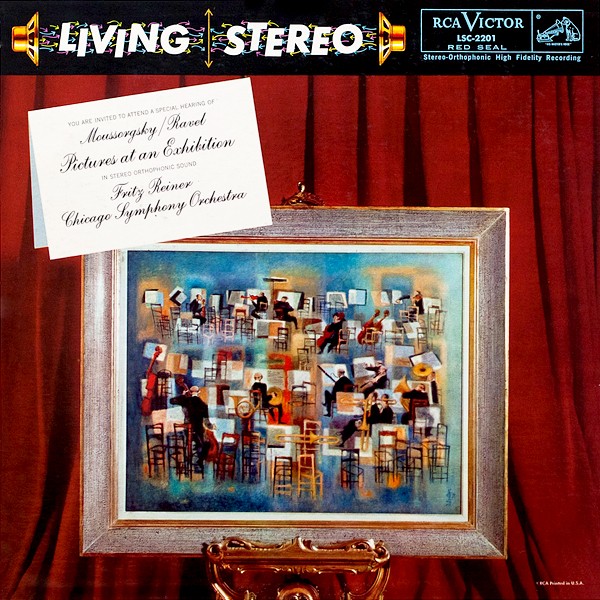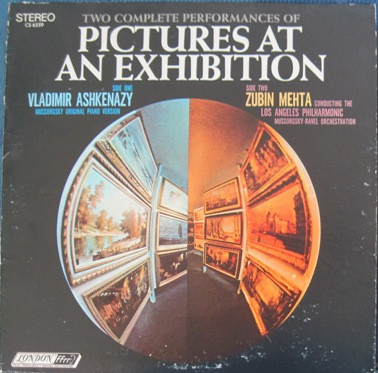If you like progressive rock, there's the Emerson, Lake and Palmer version. A three man band but Keith Emerson will give you something approaching an orchestral version with his virtuoso keyboard playing.
Pictures at an Exhibition
For someone who studied music in college, I somehow managed to miss Moussorgsky’s Pictures at an Exhibition until now. I admit I’m not a fan of large-scale orchestral works, so I avoided it not knowing that it was originally written for solo piano. I picked up both CD and vinyl copies of the solo piano version and I think it is fabulous. A wonderful mix of simplicity and virtuosity and I can’t recommend it highly enough. I’m definitely tempted to pick up another version.
Plese let me know if you are aware of any outstanding performances of this piece. Thanks
For performance, Richter's Sofia recording made in 1958 can't be beat - everybody agrees! Problem is the recording was live and is poor. None the less it is great and sets a standard. Another very good performance in much better audio is Pletnev's on Virgin Classics. FWIW, one I listen to a lot is Noriko's version on BIS. |
It was my impression the OP was asking for piano performances, not the version orchestrated by Ravel. An audiophile friend (Focal speakers, Linn table, etc.) considers the Ivo Pogorelich recording (DGG "4D" from 1997) to be his reference standard for piano recordings. And it is very fine: very natural, with the microphones at a normal listener’s distance from the instrument. Pogorelich is (or was) an interesting figure, by the way. I’ve got lots of stories about him; my wife was a musicologist and concert organizer in the former Yugoslavia. Amazing technique! |
One of my favorite works. This is my favorite piano version (Byron Janis)! As a bonus, it also include the orchestral version with Antal Dorati and the Minneapolis Symphony. https://www.amazon.com/Moussorgsky-Pictures-Exhibition-Chopin-Etude/dp/B0000057MI |
**** You know it’s all about the conductor getting the orchestra inline.**** Not quite. I would put what @mayoradamwest wrote somewhat differently. Yes, the conductor’s vision for the work is the primary guiding force, but still far from “it(s) all”. The smart conductor gives much consideration to the strengths and weaknesses (minor, relatively speaking, in major orchestras) of a particular orchestra, its musical traditions and its principal players. When that happens is when the truly great performances happen. This work happens to be one for which the conductor’s choice of tempo for each “picture” can make or break the performance. The players do the heavy lifting, but ultimately they have to play to the conductor’s tempo, as just one example. My favorite recordings of the Ravel orchestration of this work are the Chicago/Kubelik 1951 recording. I prefer it to the vaunted Reiner. Outstanding performance and excellent mono sound. Another, and probably my favorite overall, is the Muti/Philadelphia which also features very nice saxophone playing in “The Old Castle”. Sadly, the saxophone playing in this beautiful “picture” is usually lacking in otherwise good overall performances. It is also a great example of how the choice of tempo can make or break a work. Some conductors like to conduct this movement at lethargic tempos. Muti takes it at a tempo that moves forward, yet still evocative. Very beautiful.
|
I was watching several different performers playing the piece on You Tube yesterday and I was astounded at the differences in approach. The touch, tempo, dynamics. When I was in school, we studied the fact that the “scholars” differed on how older music was originally played, but Pictures was written in 1874, which is not that long ago, compared to Bach, etc. I was very surprised at how 4 different concert-level players took such different approaches. Very interesting to watch. |
Not as well known but IMO up there with the best : Victoria Postnikova (wife to Guennadi Rozhdéstvenski) piano, Melodya 46049-2 There was a reissue on Olympia I believe.
|
I have enjoyed listening to Boyk, Pictures at an Exhibition on Performance Recordings PR-7. Its available in vinyl or CD. The release issued in 1990 and was mastered by Doug Sax at The Mastering Lab. It is advertised as all analog and that it uses all tube electronics before the recorders. I see it available used on Discogs and it is mostly inexpensive. James Boyk was in the music department at Cal Tech. |
An extraordinarily inspirational and fun presentation was from Emerson, Lake and Palmer, when in fall of 1977 they outrageously thought that they could take the show on tour with a 70 piece orchestra. After only a few weeks, they realized the folly of such expense and had to dismiss the orchestra. All were heartbroken as so much fun had been in in the offing, that the orchestra, virtually to the last person said, it's OK... You don't have to pay us. We just want to show to go on! Alas, this was impermissible under union rules, but certainly indicated the enthusiasm for the project. And who knew there were lyrics? Greg Lake, that's who. (He wrote them). This, to me, is truly goodly, spiritually speaking. |
What a fabulous piece of music and a fabulous piece of orchestration by Ravel ! I agree with the assessment of the version with The Chicago Symphony Orchestra with Kubelik conducting. it is a great MONO recording on the Mercury label. I performed it many times as an orchestral musician. I even had the privilege to perform it with Leopold Stokowski in HIS orchestration of the piece. It was good, but nowhere near as good as Ravel's original version. One of the great features of the CSO/Kubelik recording is the "Bydlo" movement. It is meant to depict a slow-moving 2 wheeled cart pulled by oxen. The solo voice is scored for solo tuba. It is supposed to sound slow and laboured. Kubelik called upon the CSO's superb tuba soloist, Arnold Jacobs to perform it on a smaller than usual tuba in the key of "F" with great effect ! Many times today, it is performed on a "tenor tuba" or euphonium to make it far easier to perform but it loses the heavy, laboured character that was originally intended. I studied with Mr. Jacobs for a bit and he thought it was just another day on the job ! What an orchestra !! |
@chayro perhaps I missed it but who is the Pianist on the recording you praised in the OP? @rvpiano recommendation is excellent. I usually play the Richter Sofia recording that was mentioned upthread, but it does suffer from cramped mono sound and sounds like it was recorded in a TB sanitarium. Richter is incandescent however- Bydlo in particular-and it’s one of those special musical moments where you just have to put up with the sound. Katia is my modern go to. Byron Janis is a very good recording from the early stereo era
|
@mahler123 - you didn’t miss it because I didn’t say. It’s Denes Varjon. And I just ordered the Yamashita guitar version on CD. Should be interesting. My vinyl version is Lorin Hollander, but I think I only listened to it once because I am waiting for a new cartridge. |
So this is funny- I said above that I ordered the Yamashita guitar version on CD, but apparently I ordered the sheet music, which looks like what we used to call flyshit back in my musical years, meaning a lot of notes. I have a friend who plays guitar that will probably like to fool around with it. A lesson to read carefully. |
I play guitar as well, but never learned to sight read despite knowing the notes, the musical staff, etc. I wish your friend ALL the luck in the world with his pages of flyshit. Even if I COULD sight read, I expect it would drive me BATshit. |
@mahler123 - Yamashita transcribed it for guitar and recorded it as well. BTW, I retuned it. Nobody I know could come remotely close to playing it. |



